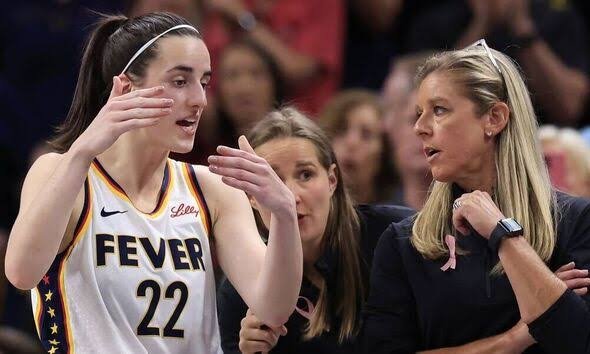
Caitlin Clark, the rising star of basketball, has recently received cautionary advice regarding her growing reputation as a potential “coach killer” following the dismissal of Christie Sides from her position as head coach of the Indiana Fever. Sides, who was 47 years old at the time of her termination, had successfully guided the Fever to their first playoff appearance since 2016, but was let go after the team’s disappointing exit in the first round of the playoffs. The Fever’s organization has now turned to Stephanie White, who previously coached the Connecticut Sun, to lead the team for the next two years, with a focus on maximizing Clark’s immense potential.
As a standout player in the WNBA, Clark captured the league’s Rookie of the Year title, leading in both assists and three-point conversions last season. The excitement surrounding her performance has been palpable, but it has also placed significant pressure on her and the franchise. Following Sides’ exit, commentators and analysts have begun to speculate about the implications of Clark’s influence on coaching decisions, which has given rise to the troubling moniker.
Former coach Dan Dakich has expressed concern over the implications of Clark’s rising star status on the coaching landscape. During a recent discussion, he emphasized the weight of expectation that comes with coaching a player of Clark’s caliber. He referred to the Fever coaching position as the “most high-profile job in the league,” underscoring that with the spotlight on Clark, any missteps could tarnish her reputation. He articulated a poignant worry: if Clark were perceived as being responsible for coaching changes, it might alienate her from fans who have otherwise embraced her talent.
The discussion around Clark’s influence is intensifying as her popularity grows. Critics point out that the only significant factor that could turn public sentiment against her would be the perception of her being a detrimental force for coaches. This stigma, if it takes hold, could overshadow her accomplishments and her contributions to the game. The notion of being labeled a “coach killer” not only puts pressure on Clark but also raises concerns for her future interactions with coaches, who may hesitate to fully embrace her capabilities out of fear of negative consequences.
As the Indiana Fever embarks on a new chapter under White’s leadership, the dynamics between Clark and her new coach will be closely monitored. The potential for a strong collaboration exists, given White’s familiarity with the team and her previous roles. However, both Clark and White will need to navigate the expectations and scrutiny that accompany their roles to ensure that the focus remains on the game rather than on any perceived controversies surrounding their partnership.




